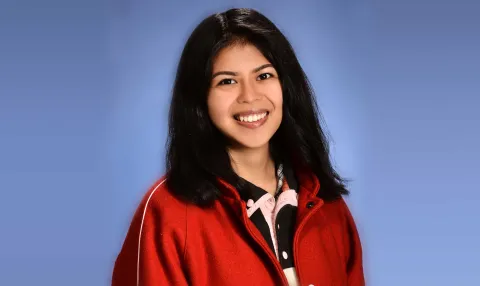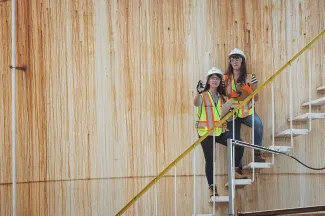"Even though being able to problem-solve is important, I think that the most valuable skill an engineer can have is the ability to listen and communicate."

Julia Dinglasan
- Degree:
- Bachelor of Applied Science
- Grad year: 2020
- Program:
- Campus: Vancouver
After spending my first year in the UBC Faculty of Science, I transferred into engineering. During my first year in engineering, I didn’t make an effort to get involved in the engineering community — I already had friends from first year residence, I figured the engineering workload was enough and I felt what can best be described as imposter syndrome. As a first-generation woman of color transferring into engineering, I felt pressure to succeed academically. At the end of the year, I looked around in my class of 200 students and realized that I didn’t really know anyone.
After this realization, I made the decision to get involved. Since then I’ve held positions in various groups, including UBC Civil Engineering Club (President 19-20, VP Student Life 18-19/17-18), UBC Engineering Undergraduate Society (Councillor/Committee Member 19-20, 14 Not Forgotten Manager 17-18, Sustainability Representative 17-18), UBC Women in Engineering (committee member 18-19), and UBC Concrete Toboggan (member 17-18). I met wonderful people, made so many fond memories as a result and realized that finding a community in engineering actually helped my academics. I also realized that I could leverage my role as a student leader in civil engineering to create an inclusive environment to uplift and celebrate people of all backgrounds through culture-building and event-planning.
Why did you choose to go into your field of study at UBC?
I chose to study civil engineering because it is such a broad subject — people who graduate with a civil engineering degree have access to an incredible range of experiences: from designing dams, bridges, and buildings to city planning, construction management and traffic planning. I ended up focusing more on the hydrotechnical subdiscipline, but it's neat to have so many options from which to choose.
What has made your time at UBC memorable?
I’m from California, so having the opportunity to live for 5 years in a new city/country was definitely a memorable experience. I will always keep the relationships I fostered during my time in Vancouver close to my heart. Vancouver is a beautiful city and I am forever impressed by the crystal-clear water, the proud mountains, the cherry blossoms in the spring, the ridiculously robust food scene and the buses that say “SORRY.”
What has been your most valuable non-academic experience studying at UBC?
I served as the president of the Civil Engineering Club this past year, which functions akin to a student council for all civil engineering undergrads. When I first joined the Civil Engineering Club, I joined as the secretary and that was probably one of my best decisions in undergrad. I am someone who flourishes when I have a community. Erica Mason, the president at the time, really empowered me — and I found myself taking on the roles of Mentorship Coordinator and co-VP Student Life on top of secretary during my first year in the club. Civil engineering is a big department, and sometimes it feels easy to feel lost in the sea of the 550 students in the program. Getting involved made it easy to find a community.
Tell us about your experience in your program. What have you learned that is most valuable?
Going into engineering, I thought that being good math would be the most important skill in the engineers' metaphorical toolbox. As I've spent more time in the program, I've realized that even though being able to problem-solve is important, I think that the most valuable skill an engineer can have is the ability to listen and communicate. Civil engineers design the built environment and help manage the natural environment. This gives us a lot of power. This power should be used to uplift communities; however, as with all kinds of power, this can potentially be abused. Engineers are supposed to serve the public interest, and this can only be done by properly listening and communicating with stakeholders--and to be earnest, honest and open-minded while doing so. Being good at listening and communicating will make it easy to convey information to clients, coworkers, subcontractors and all other professional relationships within the field.
How are you applying the skills you learned through your studies at UBC?
Right now, I am applying my technical knowledge as an independent contractor at a civil engineering consulting firm in San Francisco. Outside of my career, I will continue to apply important life lessons I picked up throughout my degree such as: understanding how to achieve a work-life balance, social/leadership skills and an obscure knowledge of different types of rocks (and which ones are probably safe to lick).
What advice would you give a student entering your degree program?
Find things outside of engineering that make you happy! Your entire university experience doesn’t necessarily need to revolve around just engineering. Maybe your thing is hitting the gym or hanging out with friends or educating yourself on social justice issues or learning how to ferment various vegetables. Whatever your thing is, it’s nice to have something to turn to if you ever want a break from engineering.
How do you feel your degree has benefitted you compared to a different field of study?
Engineering straddles the line between science and art — it uses science concepts to make art a reality. I think that being in engineering has made me appreciate both subjects even more.
Where do you find your inspiration?
So many people come to mind when I think of this question. I have an incredible support circle. I am inspired by my sister, my parents, my friends, my partner and my family. Every single person with whom I choose to spend my time has several qualities that I find inspirational.
What are your immediate and/or long-term plans for the future?
My short-term goal is to cake a sourdough starter that actually works. My long-term goal is to empower other femmes of color who are pursuing a career in engineering.
What are your future plans to make a difference in our world?
Civil engineers have a ton of potential to shape the world around us in ways that can simultaneously improve the environment and champion historically marginalized communities. The possibilities range from providing remote communities clean and reliable water to designing equitable transportation systems and creating sustainable buildings and cities. Right now, I’m compiling a list of resources that touch on the intersection between social justice issues and civil engineering. This list includes podcasts, videos, articles, books — you name it. The goal is to start an industry-wide conversation on the civil engineer’s roles in the context of broader social issues.
Is there anything else about your degree experience you'd like to elaborate on?
My mental health was pretty poor my first two years of university. By my final year, I was in a better mental state. I didn’t go to counselling — though in hindsight, I should have — but there were a few things that I believe contributed to the improvement of my mental health. These things include building a community, involving myself in various groups, finding things I am passionate about, exercising regularly, taking study breaks and honestly, not dedicating so much of my mental state to worrying about grades.
Something that I want students entering the engineering program to know is that the engineering community is trying to create stronger networks for mental health support. I was working with the Department of Civil Engineering to create events raising awareness for mental health. In terms of systemic changes, I was also advocating for the option of recorded lectures, more summer courses and other initiatives that would help people facing mental health issues. I am not alone in this advocacy —there are a lot of other student leaders who share my experience and are vocal about mental health support. I am hoping that this movement continues to build momentum in the future.
How has your identity informed your academic and professional experiences within your field at UBC and beyond?
I am proud to be a woman of color — a Filipina woman to be exact. My experience as a visible minority in engineering has informed me in many ways. I believe it has made me more receptive and empathetic to other marginalized voices. This ability to seek out and listen to other people’s perspectives enhances my ability to communicate, which in turn helps me be a better engineer.
Although my identity lies at the intersection of different forms of oppression, there are many ways that I am privileged — for example, I come from a middle class upbringing, I have the opportunity to obtain higher education, I benefit from the model minority myth, etc. I am trying to better recognize the ways in which my privileges inform my experiences. I've made some progress, but there's still a whole lot more to understand. I'm looking forward to learning more about it!




